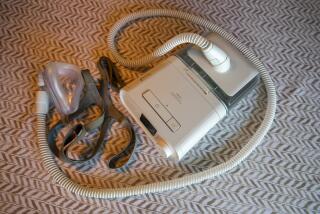Medical Device Regulation Rapped : Health: Investigators say problems with a gel made by Optical Radiation of Azusa exemplify FDA laxity.
- Share via
WASHINGTON — Government investigators charged Wednesday that regulation of the medical device industry is so lax and unresponsive that dangerous products, including a surgical gel manufactured by an Azusa-based firm, have been allowed on the market and have harmed some patients.
The harsh findings are contained in a General Accounting Office study of the Food and Drug Administration’s oversight of the hundreds of new medical devices marketed every year, ranging from simple thermometers to computerized axial tomography (CAT) scanners.
The charges were made at a hearing of the House Energy and Commerce subcommittee on investigations, chaired by Rep. John Dingell (D-Mich.).
One product highlighted during the House subcommittee hearing on FDA enforcement lapses was Orcolon, a surgical gel manufactured by Optical Radiation Corp. of Azusa. The gel, blamed for two cases of blindness, is no longer being distributed.
The sequence of events that led to Orcolon being brought to market is a dramatic example of how FDA procedures can go awry, the investigators said.
The company’s former research director informed regulators that Optical Radiation had encountered problems manufacturing Orcolon, a “viscoelastic” used in eye surgery. The former employee said the company’s plant in Puerto Rico had inadequate quality controls, according to a 1988 FDA inspection report.
A company spokesman told the Wall Street Journal that the employee’s allegations were “unfounded” and that he was fired for “poor performance.”
In March, 1991, the FDA gave Orcolon “premarket approval,” but clinical problems with the gel subsequently were found. A Michigan ophthalmologist wrote to the FDA in April, 1991, about patients with “delayed intraocular pressure,” which he attributed to the drug, and urged the FDA to halt its sale and use.
In July, 1991, he reported to the manufacturer that two of the 12 patients he had treated with Orcolon “are blind because of your product.”
Under pressure from the FDA, Optical Radiation ceased distribution of Orcolon in September and instituted a recall in October. As of March of this year, Optical Radiation has filed with the FDA more than 270 adverse-reaction reports on Orcolon.
In a written statement released before the hearing, Optical Research Corp. President Richard D. Wood defended the company’s actions. “In the face of an elusive and very complicated problem, Optical Radiation made every effort to determine the source of the problem and . . . throughout this process the company acted responsibly,” he said.
Although the Food and Drug Administration is supposed to inspect medical device manufacturers every two years, the GAO found that fewer than 60% receive regular inspections.
While more than half the inspections uncover problems, only 16% receive attention, the GAO said. The FDA takes action in only half the cases in which the most serious violations are found, the investigators said.
Eleanor Chelimsky, the assistant comptroller general, testified at the hearing that the FDA oversight system is “badly flawed” and that the agency has had little interest in aggressive enforcement “for a very, very long time.”
James S. Benson, director of the agency’s Center for Devices and Radiological Health, admitted that “we did not devote the level of resources . . . that we see are necessary in today’s times.” But he said the FDA had already toughened enforcement last year and doubled its seizures and injunctions against firms promoting flawed products.
“If there are any problems with the integrity of our programs . . . we will act to correct (those) problems,” Benson testified.






